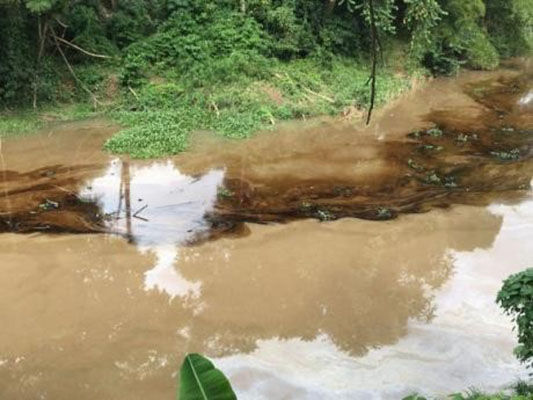(Jamaica Gleaner) Trade Winds Citrus Limited (TWCL) has responded to public discourse regarding the agreement it struck with the Natural Resources Conservation Authority (NRCA) for discontinuation of a case against it for an oil spill in the Rio Cobre last December, saying “there is nothing secret or controversial about this agreement”.
The company says the focus of the agreement was on enhancing its environmental stewardship and ensuring its ongoing commitment to sustainability.
It stresses in a statement released to the media that the agreement “did not involve any form of monetary compensation”.
“The agreement was based solely on the continued commitment of TWCL to uphold and expand its use of best environmental practices, as well as further collaboration with local groups to develop sustainable solutions for the protection of the Rio Cobre river and surrounding ecosystems,” the company says.
It has also outlined the chronology of events since the oil spill on December 12, 2023 and the steps it took to address the issue.
TWCL says on December 12, 2023, it was made aware of an oil spill at the Dairy Farmer’s Facility, an outdated beverage processing plant it had recently purchased.
It says the spill affected a 1.4-kilometre canal located on the property. This canal, shared by several other companies and residences, leads to the Rio Cobre.
Upon notification, TWCL says it acted immediately to contain the spill, taking swift action to prevent further contamination. Measures included:
● Blocking the mouth of the canal to prevent contamination of the river.
● Creating check dams at intervals upstream in the canal.
● Deploying oil booms, absorption pads, and skimmers to recover the oil and limit its spread.
TWCL says it launched an immediate and comprehensive clean-up operation, working in close partnership with environmental experts and agencies, including the National Environment and Planning Agency (NEPA).
It says regular monitoring and testing of both water and soil confirmed its compliance with the NRCA’s Revised Standards for Petroleum in Groundwater and Soil.
It also says assertions that local fishermen were unable to fish due to the incident are unfounded as there was no evidence of any environmental damage or a fish kill.
“TWCL has always demonstrated a strong commitment to environmental protection. The company remains steadfast in its dedication to the environment and upholding the highest standards of environmental management. TWCL reaffirms its commitment to best practices and has intensified efforts to safeguard the Rio Cobre river and its surrounding ecosystems,” the company states.
It says as part of its proactive approach, it is fully compliant with the Government of Jamaica’s recent mandate to ban any form of discharge into the Rio Cobre.
TWCL says it also operates an NRCA-approved wastewater treatment system, which recycles all discharge for the irrigation of its crops.
“Recognising the challenges the government’s mandate may pose for other companies, TWCL has offered to share its wastewater disposal solution as a model for broader industry compliance,” it adds.
In addition, TWCL says it has made several kilometres of its riverfront property available for NEPA to install early detection devices. These devices will provide real-time alerts for potential pollutants, reinforcing efforts to protect the Rio Cobre and its ecosystem.
Various groups have come out strongly against the NRCA’s decision to discontinue prosecution and its initial decision not to release the details of the agreement.
The agreement has since been published on NEPA’s website.
Describing details of the secret pact between the NRCA and Trade Winds Citrus Limited as “worse than anticipated”, attorney-at-law Marcus Goffe said the environmental body acted against Jamaicans’ interest when it discontinued prosecution.
“It’s a straight sell-out because here it is in the agreement, NEPA is committed to not assisting the public to get justice – the communities who brought a claim against Trade Winds. So they are therefore agreeing in the agreement to protect Trade Winds against the public interest. So it’s worse than we thought because they obviously colluded and that is why they didn’t want it to come under scrutiny,” Goffe told The Gleaner.

